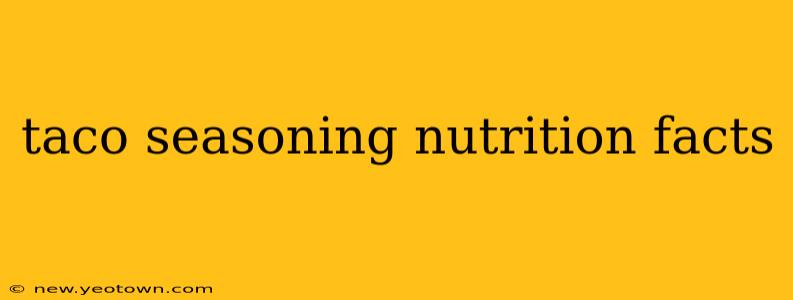The aroma of sizzling tacos, the vibrant colors, the explosion of flavor – it's a culinary experience we all crave. But have you ever paused to consider what's actually in that seemingly simple packet of taco seasoning? It’s more than just a blend of spices; it’s a complex mix of ingredients that significantly impact the nutritional profile of your final dish. Let's delve into the world of taco seasoning nutrition facts, uncovering the good, the bad, and the surprisingly interesting.
This isn't just about calories; we'll explore the sodium content, the surprising sources of fiber (or lack thereof), and the potential impact on your overall health. We'll also tackle some frequently asked questions that often pop up when considering the nutritional aspects of this beloved kitchen staple.
What are the main ingredients in taco seasoning?
Typically, taco seasoning blends chili powder, cumin, paprika, garlic powder, onion powder, oregano, and cayenne pepper. However, the exact mix varies considerably between brands. Many commercially produced seasonings also include salt, preservatives, and sometimes even added MSG (monosodium glutamate) for enhancing flavor. This variation is key to understanding the wide range in nutritional information you'll find on different products. One brand might emphasize natural ingredients, while another prioritizes cost-effectiveness, leading to different nutritional profiles.
The base spices are generally a good source of antioxidants, but the added ingredients significantly affect the overall nutritional value.
How many calories are in taco seasoning?
The calorie count in taco seasoning itself is remarkably low – typically under 15 calories per serving, often even lower. However, this negligible calorie count is deceptive. The seasoning is usually used in small quantities, but it’s crucial to remember that the way you use the seasoning massively impacts the final calorie and nutrient content of your taco dish. The added oil, meat, cheese, and other ingredients contribute significantly to the overall caloric value of the meal. Therefore, the seasoning's calorie count is only a small piece of the bigger nutritional puzzle.
How much sodium is in taco seasoning?
This is where the nutritional picture changes dramatically. Sodium content is significantly higher in most taco seasonings, often exceeding 500mg per serving. This is a substantial amount, especially considering many people use more than one serving per recipe. Excessive sodium intake is linked to high blood pressure and other health issues, making this a vital consideration, particularly for individuals watching their sodium consumption.
Is taco seasoning gluten-free?
Most taco seasoning blends are naturally gluten-free, as the primary ingredients are spices and herbs. However, always check the label. Some brands may use fillers or additives that contain gluten. Reading the ingredient list carefully is essential to confirm gluten-free status if you have celiac disease or a gluten intolerance.
Does taco seasoning contain sugar?
Many taco seasoning blends contain added sugar to enhance the flavor profile. While the amount might seem minimal, it can accumulate over time. For those watching their sugar intake, checking the nutrition label for added sugar is recommended. Opting for brands with minimal or no added sugar can help manage sugar consumption more effectively.
What are the health benefits of taco seasoning (if any)?
The primary spices in taco seasoning possess potential health benefits due to their antioxidant properties. Chili powder, for instance, is rich in capsaicin, which has anti-inflammatory effects. However, these benefits are significantly diluted by the high sodium content and sometimes added sugar and preservatives in many commercial blends. Therefore, while the base spices hold potential health advantages, the overall nutritional profile of many readily available taco seasonings can negate these benefits.
Making your own taco seasoning: A healthier alternative?
Considering the high sodium and sometimes added sugar in commercially prepared blends, many people choose to make their own taco seasoning. This allows for complete control over ingredients, enabling you to reduce the sodium content significantly and exclude added sugars or preservatives. Homemade versions often incorporate fresh herbs and spices, boosting the nutritional value and flavor.
In conclusion, while the calorie count of taco seasoning might seem insignificant, the sodium content and other added ingredients are critical to consider. Understanding the nutritional breakdown helps you make informed choices about your food and build healthier eating habits. For many, homemade versions provide a more healthful and flavorful alternative.

